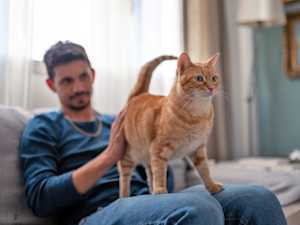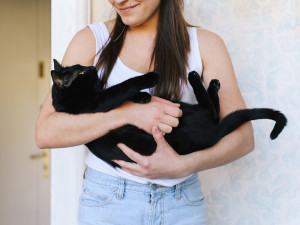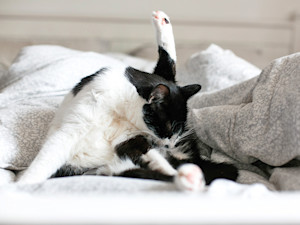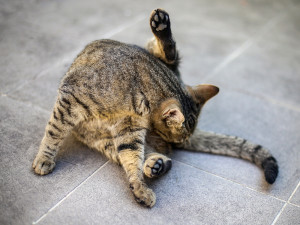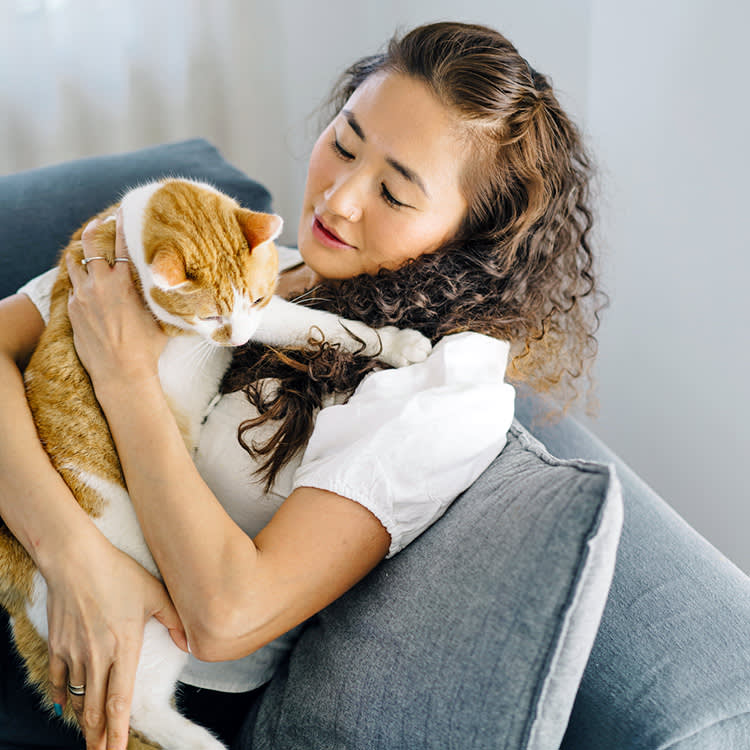
Share Article
In This Article:
When Is Anal Gland Leaking a Serious Issue? What Causes Anal Gland Discharge in Cats? How to Treat and Manage Anal Gland Problems in Cats Frequently Asked Questions
There’s nothing cuter than snuggling with a warm, purring, cat-loaf, but when they leave behind a streak of foul-smelling anal gland secretions, it’s definitely less cute. You may not realize at first that this is the problem; sometimes cat parents think these secretions are poop because they can be brownish in color and have a strong odor. However, anal gland secretions tend to be a much smaller amount than what a cat would poop.
They also don’t require your cat to contract their belly the way they do when they are having a bowel movement. If you have determined that your cat is releasing anal gland fluid, you’ll want to get to the bottom of why this is happening. The good news is that most of the time, this is not a serious medical problem and with proper treatment and management, it should resolve. Read on to learn more about anal gland problems in cats.
When is anal gland leaking a serious issue?
Anal gland leaking can become a more serious problem if it is happening frequently or it is accompanied by other medical problems. Some helpful guidelines to consider include:

When to monitor
If you just noticed your cat’s anal gland discharge once, and they are otherwise acting fine, you can monitor them at home to see if the problem recurs or if any other health concerns arise. Once you are aware of the issue, keep an eye out for signs they are uncomfortable including scooting, licking their hind end obsessively, and other signs of pain.
When to seek veterinary care
If you notice that your cat has anal gland discharge repeatedly, it is important to get it checked out as this is not normally a recurring finding. It is also important to see a vet if your cat has other signs of illness or pain, including diarrhea, vomiting, loss of appetite, lethargy, bleeding from the anal gland region, or other changes in their health or behavior.
What causes anal gland discharge in cats?
Abnormal anal gland discharge is caused by problems that interfere with the normal function of the anal glands. The anal glands are two small sacs located within the wall of the anus at the 4 o’clock and 8 o’clock positions. Each gland has a small tube or duct that leads to the outside, allowing the fluid from inside the gland to be released.
The glands are normally emptied when cats have a bowel movement, and the pressure of the poop presses against the glands, emptying them. The scent from the anal glands is thought to be part of how animals communicate with one another. Problems that interfere with this process at all any level can cause abnormal discharge or leakage from the anal glands. This includes:
Fear
When cats are suddenly frightened or feeling very fearful, they may release fluid from their anal glands. This is typically an isolated incident, although it can recur if they are startled again at another time. It would be accompanied by other very clear signs of fear including vocalizing, piloerection (or puffing up of their fur), growling, or trying to flee.
Impaction or blockage of the ducts
The ducts that allow the anal glands to drain are very narrow and can become blocked if there is inflammation of the surrounding skin. This can happen due to allergies or other skin conditions, as well as other problems that cause the fluid within the gland to become too thick and dry to easily pass through.
Infection or inflammation
“Anal sacculitis” is the technical term for inflammation of the gland. Conditions that cause generalized inflammation of the skin can also cause inflammation of the anal glands. Additionally, if the anal glands become impacted and the secretions cannot be released, this can lead to infections of the glands and possibly an anal gland abscesses, which is very painful.
Diarrhea or soft stool
The anal glands usually empty during normal defecation as the pressure of the poop pushes against the glands. When a cat has diarrhea or ongoing soft stool, this prevents the anal glands from emptying normally. As a result, they may become more full, leak, or even become impacted.
Allergies
Skin allergies lead to inflammation of the skin which can cause the ducts to swell, narrowing their opening and blocking normal emptying of the fluid. Skin inflammation can also cause irritation of the skin around the glands, leading to itchiness, redness, and scooting.
Obesity
Overweight cats can have many problems that affect their hind end and anal glands. They may have trouble positioning themselves to poop normally, which can interfere with normal emptying of the glands. Additionally, they may have difficulty reaching their hind end to clean it properly, resulting in poop getting stuck around their butt, matted fur, and additional irritation and inflammation of the skin around their anus.
Other medical conditions
More unusual conditions can also result in anal gland problems, but it is important to note that these are uncommon. This includes cancers, such as anal gland adenocarcinoma, autoimmune skin diseases, or congenital and acquired problems with the rectum and nerves that may interfere with normal pooping.
How to treat and manage anal gland problems in cats
Once you know the underlying cause for your cat’s anal gland problem, you can target them with the most effective treatment. The best place to start is by having your vet do a thorough exam on your cat to determine the problem. Based on these findings, your vet may recommend specific medical or surgical treatments in addition to at-home management. This may include:
Addressing underlying issues
If your cat’s anal gland problem is caused by a specific underlying problem like skin allergies, a food sensitivity, diarrhea, or obesity, you will need to treat these problems first. This may include a diet change in addition to other specific medications and treatments.
Clean the affected area
If your cat will tolerate you touching them back there, you can gently clean the area with warm water and a gentle pet shampoo. Try to remove any caked-on poop or matted fur. Cats that have more painful conditions like anal gland abscesses probably won’t let you touch the area, and that is a sign you need to get them to a vet for treatment first.
Warm compress
Applying a warm compress such as a washcloth moistened with warm water can be soothing and help to reduce inflammation. Ideally, a warm compress should be applied two or three times per day for at least 10 minutes each time to maximize the benefits.
If your cat is very painful, however, this may need to be postponed until you see your vet and get your cat’s pain under control first.
Use veterinary-recommended treatments
There are so many possible causes for anal gland issues in cats so it is important to start off by consulting a vet to get an accurate diagnosis and treating with the correct approach. Be sure to follow your vet’s recommendations consistently and finish all medications as directed.
Preventative measures
While not all anal gland problems can be prevented, there are some steps you can take to be proactive. Try to treat underlying conditions like skin problems, diarrhea, and/or obesity before anal gland problems occur. If you have a long-haired cat that has problems with matted fur or poop stuck around their hind end, you can have your vet or a groomer shave the fur back there to help keep the area around their butt clean.
Some vets refer to this as a “sanitary shave.” Speak with your vet about whether expressing your cat’s anal glands at home might help prevent ongoing problems, too. While this can be useful in some cases, this can also lead to increased inflammation and scar tissue, which could make it more difficult for the glands to empty normally. Plus, many cats really will not tolerate you messing around back there. So, be sure your vet recommends this and gives you a lesson in how to do so safely and effectively before attempting this at home.
The bottom line:
Cats may leak anal gland secretions for many different reasons.
The good news is that most of the time, this is temporary and there are effective treatments available.
Be sure to see your vet to get an accurate diagnosis and treatment plan started to get your cat feeling better as soon as possible.
FAQs
How do I know if my cat has anal gland issues?
Some of the most common signs of anal gland issues in cats include scooting, licking their butts frequently, a bad odor coming from their hind end, or redness, swelling, pain, or foul-smelling fluid around their butt.
What are signs of an anal gland infection in cats?
Anal gland infections may also result in scooting and licking around their butt. If they are developing an abscess due to the infection, this is very painful so cats may hide, avoid eating, cry, or react when touched in that area. The affected area may also be red, swollen, or bleeding.
When should I consult a vet about anal gland problems?
If the problem is more than just one isolated incident, or they have signs of pain or other changes in their health or behavior, it is important to see a vet.
Can I express my cat’s anal glands at home?
Cat parents can learn how to express their cat’s anal glands at home, however, the better question to ask is, should you? Most cats will really object to this and it may interfere with your cat’s trust in you if you have to be the one doing this.
Additionally, attempting to express the glands can cause increased inflammation and scar tissue, which can exacerbate problems with the glands. It is important to consult your vet before attempting this and to make sure it is truly necessary.
References
Corbee, Ronald Jan, et al. “A Cross-Sectional Study on Canine and Feline Anal Sac Diseaseopens in new tab.” Animals, vol. 12, no. 1, 31 December 2021.
Hill, PB, et al. “Survey of the prevalence, diagnosis and treatment of dermatological conditions in small animals in general practiceopens in new tab.” Vet Record, vol. 158, no. 16, 22 April 2006, pp. 533-539.
Radhakrishnan, Shalini. “Anal glands and Anal Gland Abscesses in Dogs and Catsopens in new tab.” Veterinary Partner, 11 June 2024.
Rojas, Connie, et al. “Characterization of the microbiome and volatile compounds in anal gland secretions from domestic cats (Felis catus) using metagenomics and metabolomicsopens in new tab.” Scientific Reports, vol. 13, no. 19382, 8 November 2023.

Dr. Amy Fox, DVM
Amy Fox, DVM is a small animal veterinarian in New York City with over thirteen years of experience in a mixture of general practice, emergency medicine, and shelter medicine. A lifelong animal lover, Dr. Fox studied biology in college and then worked as a veterinary nurse before pursuing veterinary school at Cornell University. Her expertise includes surgery, dentistry, and management of chronic conditions, and she is interested in toxicology, pain management, nutrition, care of senior pets, and educational outreach. Dr. Fox also enjoys writing about veterinary medicine and teaching, and her work has previously appeared in Spruce Pets. In her free time, she loves to cook, garden, go for long runs, and hang out with her goofy mixed-breed dog May, who provides never ending comic relief!
Related articles
![Cat licking it's behind in bed.]()
Understanding Cat Anal Glands and Cat Anal Gland Discharge
We cover everything you need to know.
![Cat looks at their butt]()
Why Is My Cat Bleeding From Their Anus?
It’s not a pretty problem to have, but it’s important to know how to treat this condition.
My Cat’s Butt Is Bleeding. What Should I Do?
Seems like an emergency. Is it?
Why Do Cats Put Their Butt in Your Face?
Oh, hello.
Why Does My Cat Poop Outside of the Litter Box?
The worst kind of surprise.
![Maine coon cat using the litter box.]()
Uncovered Secrets: Why Cats Don’t Always Cover Their Poop
And how you can encourage them to cover up after doing their business.

